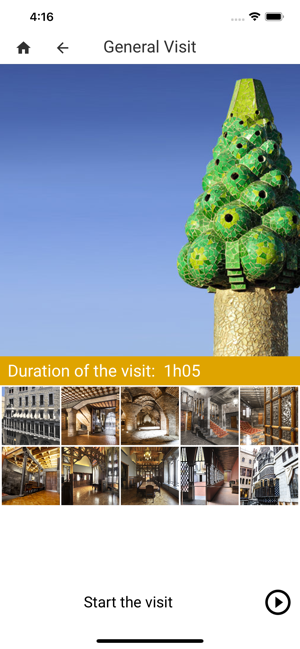價格:免費
更新日期:2020-06-23
檔案大小:49.3 MB
目前版本:1.7
版本需求:系統需求:iOS 9.0 或以後版本。相容裝置:iPhone、iPad、iPod touch。

Welcome to Palau Güell, built by Antoni Gaudí between 1886 and 1890 as the residence of the Güell-López family and a concert venue.
Palau Güell is one of the earliest examples of Art Nouveau architecture in the world. It is also one of the best conserved Gaudí buildings, since it has never undergone essential alterations. You will notice an innovative conception of space and light that is crucial for understanding the architect’s later works.

Since 1945 the building has been the property of Barcelona Provincial Council, thus enabling its conservation, preservation and dissemination. In 1984 it was inscribed as a World Heritage Site by UNESCO due to its universal and exceptional value.
The industrialist Eusebi Güell placed his full trust in Gaudí, who used materials of great value from all over the world as well as the finest craftsmen of the time to construct the mansion. Look out for the traditional high-quality materials that were used, such as stone – which came from Eusebi Güell’s quarries in Garraf and was used throughout the building – stained glass, ceramics, and wood, especially in the coffered ceilings.

The audio-guide tour begins in the coach house, where the family and guests would park their carriages. We will then move on to the stables, one of the most singular spaces in the building, which has the dual function of a basement and the building’s foundations. The load-bearing walls have been replaced with large pillars with mushroom-shaped capitals and exposed brickwork.
The social heart of the building is the main floor, which revolves around the central hall, crowned by a singular parabolic dome, one of the building’s distinguishing features. The hall played host to both religious and non-religious events, in which music played a key role. Standing at a height of 15 metres is the organ built by the master organ builder Albert Blancafort in 2011 using the original pipes from the organ built by Aquilino Amezua in 1888, whose original console can still be seen, although it is no longer in use. During your visit, every thirty minutes you will hear the organ play pieces from the repertoire of the time, transporting you back to the hall’s special ambience and allowing you to experience its excellent acoustics.

During the Güell family’s lifetime, the roof terrace was only used by the servants to hang the laundry out to dry, or when the family wanted to show guests the views of industrial Barcelona. This, however, did not stop Gaudí from letting his imagination run wild. On the roof terrace you will see how, for the first time, the architect transformed chimneys into architectural sculptures.
We would like to thank you in advance for your visit, since a large part of the entrance fee goes towards the building’s conservation, so that future generations can continue to enjoy it. We hope you enjoy the tour.

支援平台:iPhone, iPad
